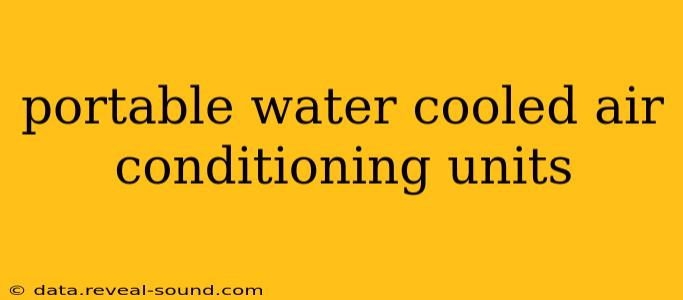The search for effective cooling solutions often leads to portable air conditioners. But for those seeking a particularly energy-efficient and environmentally friendly option, portable water-cooled air conditioners are emerging as a strong contender. This guide delves into the specifics of these units, addressing common questions and clarifying their benefits and drawbacks.
What are Portable Water-Cooled Air Conditioners?
Unlike traditional portable AC units that exhaust hot air outside, portable water-cooled air conditioners use water evaporation to cool the air. This process, known as evaporative cooling, is naturally energy-efficient and doesn't require refrigerants with high global warming potential. They typically involve a water reservoir or connection to a water source and a fan to circulate the cooled air. This makes them a greener alternative for certain climates and situations.
How do Portable Water-Cooled Air Conditioners Work?
These units operate on the principle of evaporative cooling. Water is drawn into the system and distributed over a porous material, often a pad. A fan blows air across this wet surface. As the water evaporates, it absorbs heat from the air, thus cooling it. This cooled air is then circulated throughout the room. The efficiency of this process depends heavily on humidity levels; in already humid environments, the cooling effect is significantly reduced.
Are Portable Water-Cooled Air Conditioners Energy Efficient?
Yes, generally speaking, portable water-cooled air conditioners are more energy-efficient than traditional refrigerant-based units. They consume considerably less electricity because they don't require a compressor to achieve cooling. However, their cooling capacity is generally lower, and their effectiveness is heavily dependent on ambient humidity. In dry climates, they can be exceptionally efficient; in humid climates, their effectiveness is greatly diminished.
What are the Advantages of Portable Water-Cooled Air Conditioners?
- Energy Efficiency: Lower electricity consumption compared to traditional AC units.
- Eco-Friendly: Reduces reliance on refrigerants with high global warming potential.
- Low Maintenance: Typically require less maintenance than traditional AC units.
- Quiet Operation: Often quieter than traditional compressor-based units.
- No Exhaust Hose: Eliminates the need for an exhaust hose extending outside.
What are the Disadvantages of Portable Water-Cooled Air Conditioners?
- Humidity Dependence: Cooling capacity is significantly reduced in humid environments.
- Lower Cooling Capacity: Generally cools smaller spaces less effectively than traditional AC units.
- Water Management: Requires regular refilling of the water reservoir or connection to a water supply.
- Limited Availability: May be harder to find compared to traditional portable AC units.
How much water do portable water-cooled air conditioners use?
The water consumption of a portable water-cooled air conditioner varies greatly depending on the model, its cooling capacity, and the length of use. Smaller units might use a few liters per hour, while larger models could use considerably more. Check the manufacturer's specifications for precise water usage figures. It's essential to ensure a consistent water supply to avoid interruption of cooling.
Are portable water-cooled air conditioners good for hot climates?
Portable water-cooled air conditioners are generally not ideal for hot and humid climates. Their effectiveness is severely limited in high-humidity conditions, as the evaporation process slows down, resulting in minimal cooling. They are better suited for dry or moderately humid climates.
What is the best portable water-cooled air conditioner?
There isn't a single "best" portable water-cooled air conditioner. The ideal choice depends on your specific needs and climate. Factors to consider include the cooling capacity needed for the space, water consumption rate, noise level, and budget. Researching different models and reading customer reviews can help you determine the best fit for your situation.
Conclusion
Portable water-cooled air conditioners present a compelling alternative to traditional portable AC units, particularly for users seeking energy-efficient and environmentally conscious cooling solutions. However, their suitability is heavily dependent on climate conditions. Careful consideration of your specific needs and environmental factors is crucial before making a purchase.
